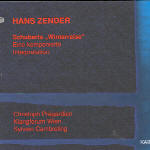What happens if the genetic codes respectively making up Schubert’s Winterreise and Kurt Weill’s Threepenny Opera become mutated into a new species? Look no further, folks, than Hans Zender’s so-called “composed interpretation” of Schubert’s harrowing song cycle. More than just orchestrating the piano part, Zender expands upon it, deconstructs it, and weaves new intros, outros, and newly composed counterpoints into the mix. He’ll jar your expectations with a momentary key change, or play hob with notions of time by having the vocal line stop and start like a recalcitrant Volkswagen negotiating the autobahn from hell. Percussive interlocutions provide biting commentaries at key textual or harmonic junctures, with all the unsubtle finesse of a Spike Jones. Just as the opening “Gute Nacht” commences with a protracted fantasia based on the song’s meditative march rhythm, the heartbreaking final song, “Die Nebensonnen”, disintegrates into dissonant, inconclusive fragments. Sylvain Camberling’s Klangforum Wien softens the edges that the Ensemble Modern points up with stinging proficiency under the composer’s direction (RCA), but I marginally prefer Christoph Prégardien’s mellower, more pliable tenor voice to the forthright timbre of Hans-Peter Blochwitz for Zender. Kairos includes full texts in German only. [5/5/2000]
































